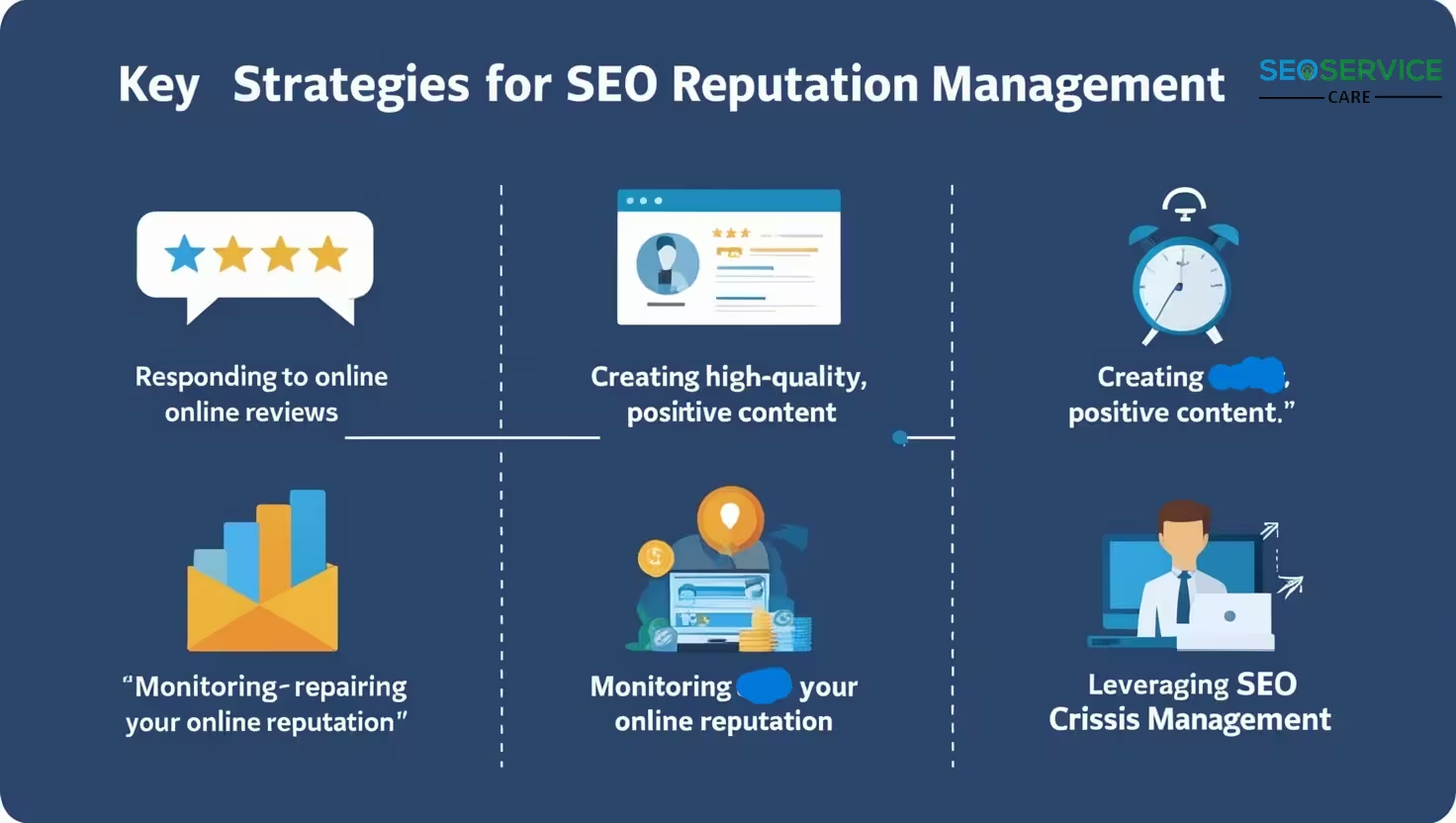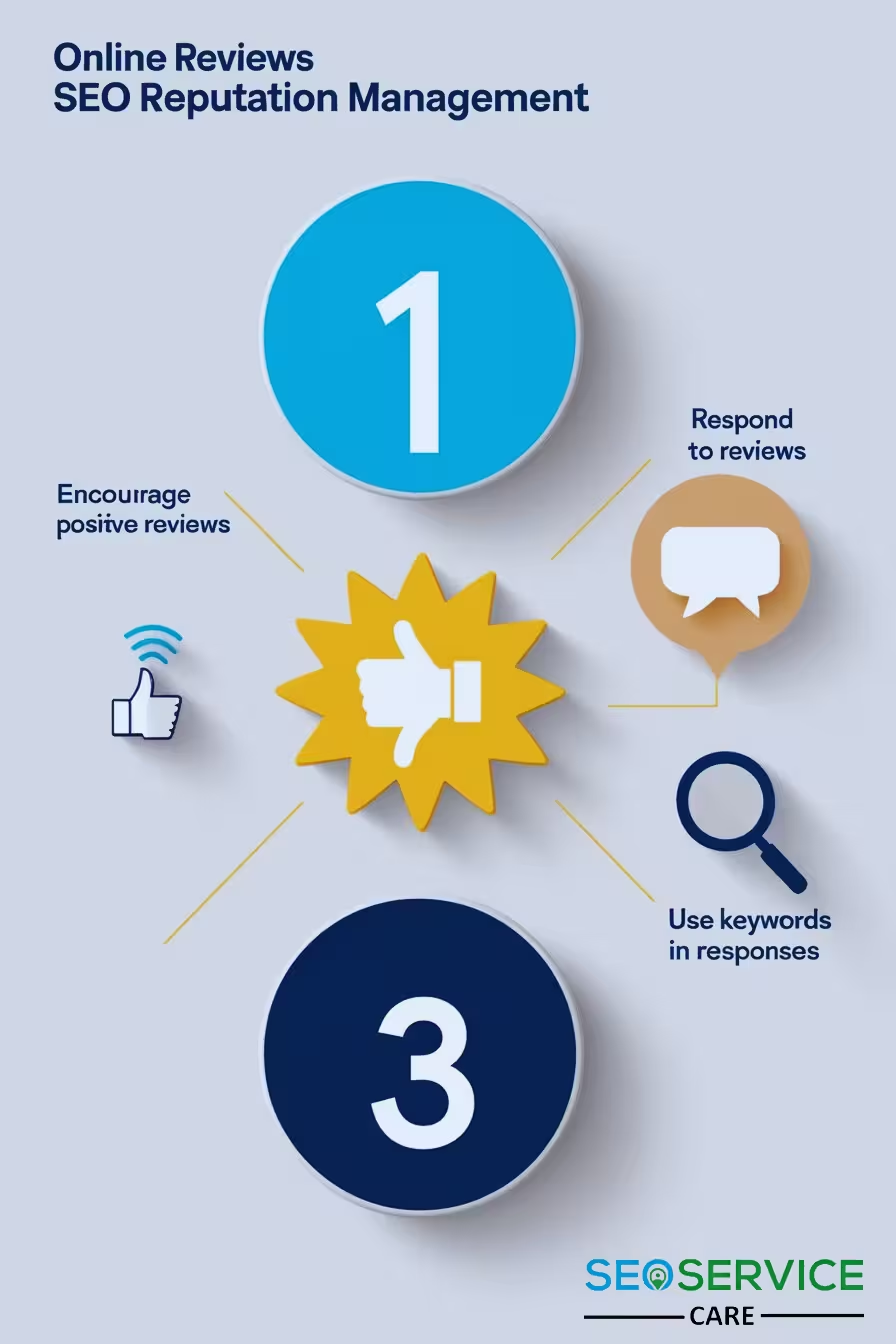Your online reputation can make or break your business nowadays. Whenever someone searches for your company on Google, they see your brand. This really reflects who you are. But what if that reflection isn’t what you want it to be? SEO reputation management helps shape your online image. It ensures that this image is positive, trustworthy, and fits your business goals.
Whether you’re a small business owner or running a large corporation, what people say about your brand online can impact your success. How do you keep a good reputation for your brand when there are so many online reviews and comments?
In this guide, we will explain SEO reputation management. We’ll go over what it is, how it works, and why it matters for your business.
What is SEO Reputation Management?
SEO reputation management is all about controlling how your brand appears online. It combines two ideas: reputation management and search engine optimization (SEO).
- Reputation Management: Watch what people say about your brand. Respond to any negative comments or reviews.
- Search Engine Optimization (SEO): This process helps improve your website. It makes your site rank higher in search results. The goal is to make sure people see your positive content first.
Using both of these strategies helps you create a good image online. This way, more customers will trust your brand and want to buy from you.
Why is Reputation Management in SEO Important?
How people see you online really matters for your business. When people search for your company, they want to see good information. If they find negative reviews or wrong details, they might think twice about choosing you.
Here’s how reputation management in SEO helps:
Builds Trust with Customers
When people look for your business online and see positive information, they are more likely to trust you. Trust is key to getting new customers and keeping old ones happy. SEO reputation management helps make sure that search results show your business in a good light.
Controls the Story About Your Brand
You can shape how people see your business online. By using SEO to highlight good information, you can lower the visibility of negative content. This way, you get to tell your brand’s story in your own way.
Improves Search Rankings
Good reputation management can help positive content rank higher in search engines. When people search for your business, they are more likely to find good information first. This is important. By using SEO strategies, you can improve how your best reviews and success stories appear in search results.
Reduces the Impact of Negative Content
Negative reviews and bad information can hurt your business. But with reputation management in SEO, you can lessen their effect. You can improve your online presence by creating high-quality, positive content. Address issues openly. This will help push negative information lower in search results. This way, it won’t affect customer decisions as much.
Boosts Local SEO with Positive Reviews
Good reviews help your business look credible and can also improve your local search rankings. Encourage happy customers to leave reviews, and respond to them well. This is especially important if you want to reach customers in a specific area, as reviews matter a lot in local SEO.
Supports Long-Term Business Success
By keeping an eye on your online reputation, you protect your business for the future. SEO reputation management is not just a quick fix; it’s something you do all the time. Share positive content regularly. This helps keep your business appealing to new customers.
Why SEO Reputation Management Matters
When people search for you online, they get their first impression from the search results. What happens if negative reviews show up at the top? It can cause you to lose customers and hurt your brand image. This is why reputation management in SEO is so important. It not only helps you solve problems, but also makes people see your brand in a better way online.
With the right SEO strategies, you can push down negative content and highlight positive mentions. This helps you build a trustworthy reputation. It’s all about ensuring that potential customers see the best parts of your business first.
Understanding SEO Reputation Management
SEO reputation management has two main parts. The first part is search engine optimization (SEO). The second part is reputation management. SEO is about making your website rank higher on search engines like Google. Reputation management is about how people view your brand. They work together to make sure your online presence ranks high. They also help create a positive impression.
- Search Engine Optimization (SEO): SEO is a set of strategies that help your content rank higher on search engines. Businesses can improve their website’s visibility. They can do this through keyword optimization, backlinking, and creating quality content.
- Reputation Management: It means paying attention to what people say about your brand and talking with them. It’s important because it helps keep the things people say positive. This includes online reviews, social media posts, and news articles. By doing this, you can make sure your brand stays strong and trusted!
- Reputation SEO: Reputation SEO helps your business stand out online. It makes sure people find positive and helpful information when they search for you. The goal is to take over the first page of search results. We want to do this with content that builds your credibility. 4o mini
Key Strategies for SEO Reputation Management

Now that we understand what SEO reputation management is and why it matters, let’s look at some effective strategies. These will help you manage your online reputation.
1. Responding to Online Reviews
Online reviews are one of the first things potential customers see. They can be on Google, Yelp, or social media. Here’s how to handle them:
- Positive Reviews: Always thank customers for their positive feedback. This shows you appreciate their support. Responding can encourage others to leave good reviews too.
- Negative Reviews: Respond to negative reviews professionally. Start by acknowledging the customer’s concerns. Apologize if necessary and offer a solution. This shows that you care about your customers and want to fix any problems.
For example, if a customer complains about slow service, you could say, “I’m sorry you had a bad experience. We are working to improve our service. Please reach out to us directly, and we’ll make it right.”
2. Creating High-Quality, Positive Content
Creating valuable content is an effective way to improve your brand’s reputation. This can include:
- Blog Posts: Write helpful articles that answer common questions or offer advice related to your business.
- Case Studies: Share stories of satisfied customers who have benefited from your products or services.
- Customer Testimonials: Highlight positive experiences from real customers. This builds trust and shows potential customers that others have had good experiences with you.
Make sure to use SEO for reputation management by optimizing this content. Use relevant keywords, like “SEO reputation management,” to help your articles rank higher in search results.
3. Monitoring and Repairing Your Online Reputation
It’s essential to know what people are saying about your brand. Use reputation monitoring tools to help with this. Tools like Google Alerts, Mention, or Brand24 can notify you whenever your brand is mentioned online.
Once you know what’s being said, you can take action:
- If You Find Negative Content: Address it quickly. You may need to contact the website owner to request the removal of false information. If it’s a legitimate review, respond professionally and try to resolve the issue.
- Promote Positive Content: Share your best content on social media and other platforms. This can help drown out any negative comments and push them down in search results.
4. Leveraging SEO Crisis Management
Sometimes, your brand may face a crisis, such as a product recall or negative publicity. In these situations, having a plan is crucial.
Here are some tips for effective SEO crisis management:
- Act Quickly: Respond to the situation as soon as possible. A prompt response shows you take the issue seriously.
- Create Positive Content: Write blog posts or articles that address the issue head-on. Share how you’re fixing the problem and what steps you’re taking to prevent it in the future.
- Be Transparent: Let your customers know what’s happening. Honesty builds trust, and people appreciate transparency during difficult times.
The Role of Online Reviews in SEO Reputation Management
Online reviews are a big part of your brand’s reputation. They can either help or hurt your business.
How to Optimize Online Reviews for SEO:
- Encourage Positive Reviews: After a customer makes a purchase or uses your service, ask them to leave a review. You can
- send a follow-up email thanking them and requesting feedback.
- Respond to Reviews: Engage with your customers by replying to both positive and negative reviews. This shows you value their opinions.
- Use Keywords in Responses: When replying to reviews, use important keywords. This helps increase their visibility in search results. If a customer names your product in their review, mention that product name in your response.
By focusing on reputation management Google reviews, you can improve your brand’s SEO and maintain a positive online image.
Tools and Services to Boost Your Reputation Management Efforts
Managing your reputation online can feel overwhelming. Fortunately, there are many tools and services that can help you stay on top of your brand’s image:
- Reputation Monitoring Tools: Services like Google Alerts, Mention, and Brand24 can help you track what people say about your brand. They send notifications whenever your name is mentioned online.
- Online Reputation Repair Services: If you have trouble managing your reputation, think about hiring a professional service. They can help you push down negative content and promote positive reviews.
- SEO Tools: Tools like SEMrush or Ahrefs can help you analyze your website’s performance and identify areas for improvement. They can also provide keyword suggestions to optimize your content.
How Appropriate Information Management Builds Reputation
Effective information management means showing the right content to your audience. This should happen at all times. Using SEO for online reputation management helps businesses control information about their brand. This way, they can ensure that only positive and relevant content shows up in search results.
When your business is proactive about managing information, it builds credibility and trust. Customers feel more confident when they choose your brand. They like to see a consistent and positive message on all online platforms.
Conclusion: Take Control of Your Brand’s Online Reputation
Your online reputation can make or break your business you know. You can control what people see when they search for your brand. To do this, effective SEO reputation management strategies must be implemented. Responding to reviews is important. Creating high-quality content also matters. Each action you take to manage your reputation builds trust. This helps you gain credibility.
SEO helps businesses manage negative content and promote positive reviews. It provides the tools they need to build and protect their reputation.
Don’t wait until negative content hurts your business. Contact us today to learn more about how we can help you manage your online reputation effectively!
FAQs about SEO Reputation Management
1. Why is online reputation important?
Your online reputation affects how customers view your brand. Positive reviews and content build trust, while negative comments can drive customers away. Managing your reputation helps attract and retain customers.
2. How can I encourage positive reviews?
You can ask satisfied customers to leave reviews after they purchase or use your service. A friendly follow-up email or a thank-you message can motivate them to share their positive experiences.
3. What should I do about negative reviews?
Respond to negative reviews professionally and quickly. Acknowledge the issue, apologize if necessary, and offer a solution. This shows you care and can turn a bad experience into a good one.
4. How can I monitor my brand’s online reputation?
Use reputation monitoring tools like Google Alerts or Mention. These tools notify you whenever your brand is mentioned online, allowing you to stay informed and respond promptly.
5. What is the role of content in reputation management?
Creating high-quality, positive content helps improve your brand’s image. Blog posts, testimonials, and case studies can show your expertise. They can also help push negative content down in search results.
6. When should I seek professional help?
If managing your online reputation feels too hard, you are not alone. If you are facing a big crisis, you might want help. Consider hiring professional reputation management services. They have the expertise to help protect and enhance your brand’s image.






